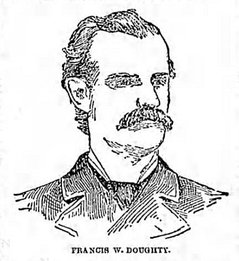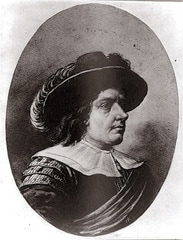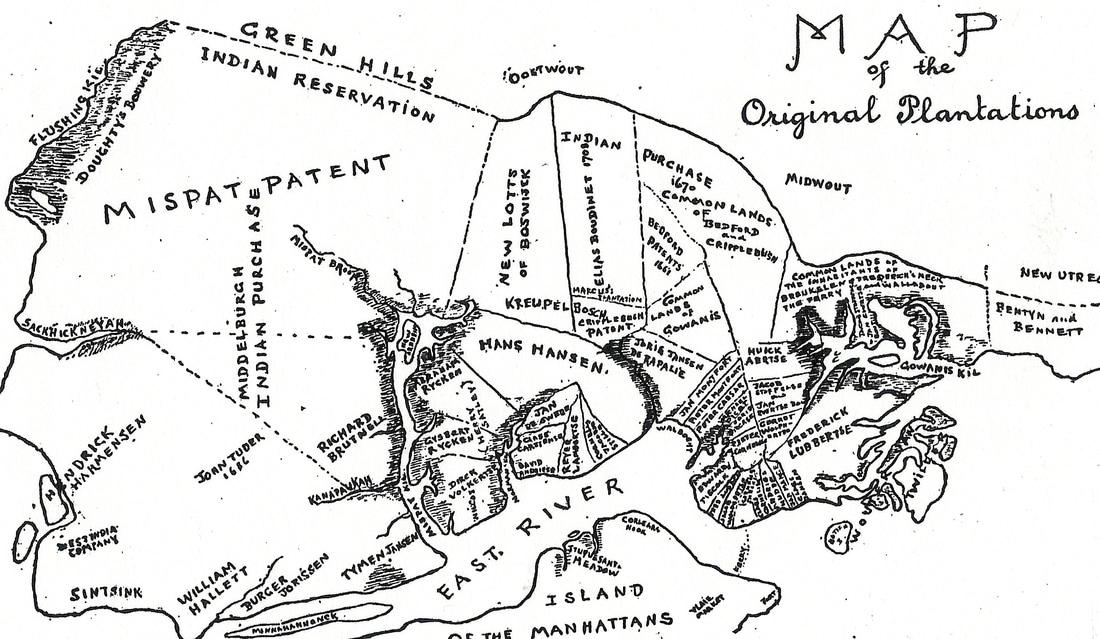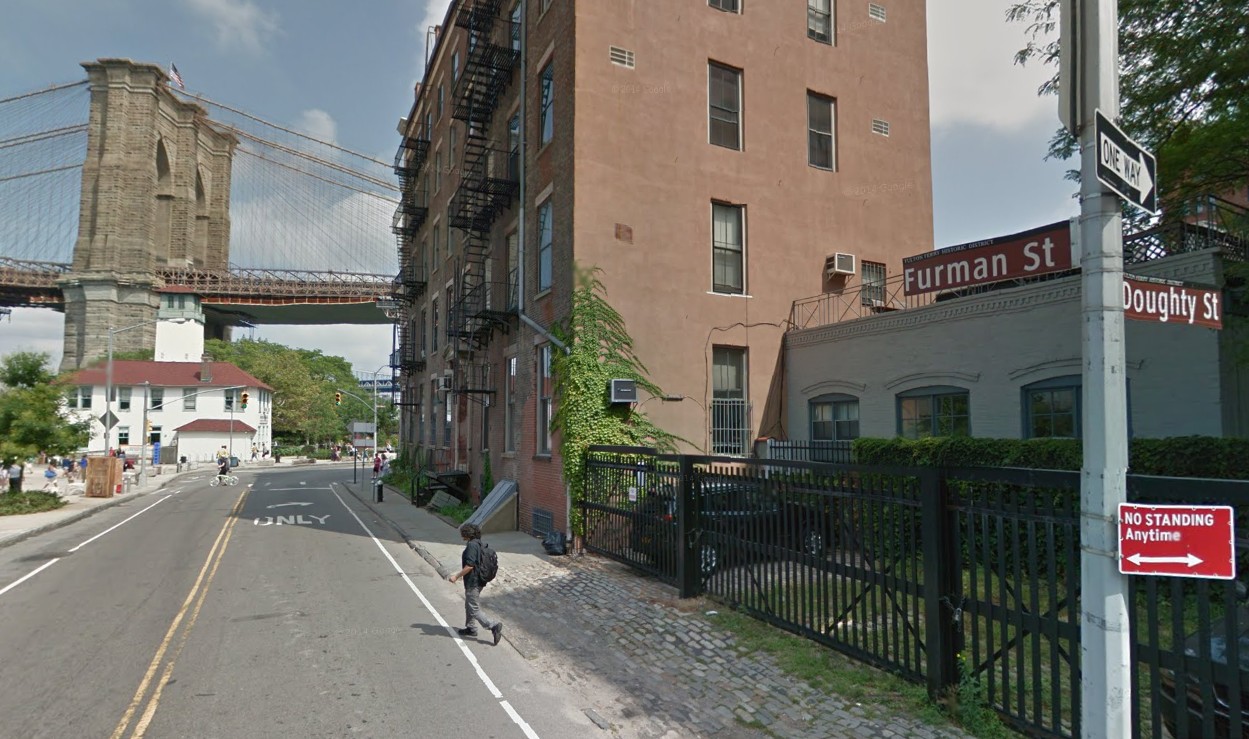
The Doughty family in America are all descendants of one individual, the Rev. Francis Doughty (left), who emigrated from England and settled at Taunton, Mass., about the year 1633, which places him among the earliest of the Puritan fathers following in the footsteps of the Mayflower pioneers. The Brooklyn Doughty family are the descendants of Elias, second son of the Rev. Francis Doughty. Their first appearance in the city is believed to have been about the year 1690; there is, however, no absolute proof in the possession of the writer that this date is correct, although it can’t be more than a decade or so out of the way.
The Doughty family in England is of exceedingly ancient origin, dating back before the Norman Conquest. Originally the name was spelled “Doghtig”, and its significance now used in derision, was certainly expressive of the characteristics of the race. The first Doughty mentioned in history was one of Sir Francis Drake’s party on the Golden Hind, in the famous voyage performed by that ship round the world. Accused of mutiny, this individual, Thomas by name, was convicted and beheaded off the coast of Patagonia. The accusation was manifestly false and prompted by the jealousy of Drake.
Whether or not the Rev. Francis Doughty was an immediate descendant of Thomas is not known. The first notice of him is found in the annals of Taunton and reads as follows:
- “Cohannet, alias Taunton, is in Plymouth patent. There is a church gathered there of late and some ten or twenty of the church, the rest excluded. Master Hooke, Pastor; Master Street, Teacher. One Master Doughty (Rev. Francis) opposed the gathering of the church there, alleging that according to the covenant of Abraham, all men’s children that were of baptized parents, and so Abraham’s children, ought to be baptized, and so spake in public, or to that effect, which led to a disturbance, and the ministers spake to the magistrate to order him out, the magistrate commanded the constable who dragged Master Doughty out of the assembly.”

To the decision of Kieft, Mr. Doughty strongly objected, regarding it as not only unjust, but in direct violation of his patent, therefore he appealed from the sentence, which offended Kieft, who had previously cut off the right of appeal to the courts of Holland, and telling Doughty that his judgment was final and absolute, the despotic governor fined the defenseless clergyman $10 and locked him up for 24 hours in the common jail. Discouraged at this, Mr. Doughty requested the director general of New Netherlands “that as he had lived and done duty a long time with suitable support and as his land was now confiscated” he might be permitted to take ship for the West Indies or the Netherlands. The request was refused, as the director general had no desire to have his acts laid before the diet. Later Mr. Doughty was minister at the Flushing church, where he preached a year for the sum of 600 guilders. He finally departed for the “English Virginias” in 1648.
PATENT TO FRANCIS DOUGHTY AND COMPANIONS
We, William Kieft, etc., have given and granted, as we herewith give and grant to Francis Doughty and companions their assigns and heirs in real, actual and perpetual possession a certain piece of land, with pastures and whatever else it includes, located upon Long Island of this province containing 6,666 acres Holland measure or thereabouts, geographically enclosed between four straight lines, each 2,000 Dutch perches long, of which the first begins at the east corner of Hans Hansen's meadow dividing by the course of the creek the marsh into two equal parts, and extends to the plantation of Richard Brudnall, and then northeast passing through the middle of the fresh marsh to the small creek bounding the southern part of Henry Agricola's (Henry the Farmer's) land, then following it to its mouth the second line beginning here bends towards the southeast following the seashore to another small creek, then along the course thereof from its mouth to where you come to the eastern extremity of the same marsh (where the said creek arises), then it bends southeast, until it has reached the distance of 2,000 Dutch perches; the third beginning at the end of the last tends more westwardly and is of equal length with the former; finally the fourth starting from the last point deflects to the northwest and closes the square at the abovenamed easterly point of Hans Hansen's meadow, at which corner a stone is to be erected later for the greater certainty of the limits; with power to build on the aforesaid land a village or villages, a church or churches to exercise the Reformed Christian religion which they profess an ecclesiastical discipline; also to legally administer high, middle, and low jurisdiction; to decide civil suits for sums not exceeding 50 Holland guilders while in criminal cases their sentence of fines up to the same sum shall be final and without appeal; in other civil as well as criminal suits of greater import to pronounce the final sentence by which appeal may be referred to the supreme court of New Netherland and execute such sentence and finally to exercise all rights conferred upon the further power of nominating and presenting to the director of New Netherland some of their community, that from their number suitable persons may be selected for the civil and judicial administration with the right of hunting, hawking, fishing and trading and the immunities granted or to be granted to the of this Province, none excepted.
Wherefore the said F Doughty and his companions, their assigns and heirs are bound as long as they shall remain in possession of the aforesaid land to acknowledge the said lords’ directors as their masters and patroons, to pay after the lapse of ten years the tenth part of the produce of the fields whether cultivated with the plough, the hoe or otherwise (orchards and gardens not exceeding one acre Holland measure excepted). Finally to use the Dutch standard and no other to avoid confusion not to make use in selling or purchasing of any other Dutch weights, ell and other Dutch measures. All of which under the aforesaid conditions etc., to be countersigned by the Secretary of New Netherland and the seal of New Netherland to be affixed.
Done at Fort Amsterdam on Manhattan Island in New Netherland 28 March 1642.


 RSS Feed
RSS Feed